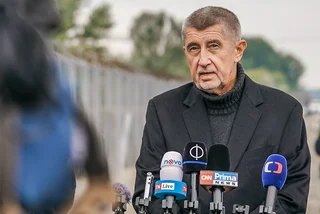Czech Republic reports 409 new Covid-19 cases Saturday, 100 more than last week
The Czech Republic reported 409 new Covid-19 cases on Saturday, about 100 more than a week ago, and the R number has risen from 1.01 to 1.05. The number of people hospitalized with Covid-19 (166) remains about the same, shows data from the Health Ministry released this morning. There are nine fewer hospitalizations than a week ago, and four less than on Friday.
The incidence rate in the Czech Republic has increased to 30 new cases per 100,000 people over the past seven days. A week ago, the incidence rate was 28 cases per 100,000 people. The situation varies across regions significantly. The incidence rate is still the highest in Prague, at 51 cases per 100,000 people over the past seven days, followed by the Moravia-Silesia Region with 49 cases.
Rate of Covid-19 vaccination slows down in the Czech Republic
The rate of Covid-19 vaccination has significantly slowed down in the Czech Republic. In September, it has taken about ten days to vaccinate 1 percent of the Czech population, compared to a single day to vaccinate the same number of people in July, according to data released by the Czech Health Ministry. Over the past five days, the total percentage of vaccinated Czechs rose by only 0.2 percent.
Health Minister Adam Vojtěch previously stated that respirators would not be mandatory in shops and public transport once the Czech Republic managed to vaccinate 75 percent of its population. To reach this goal, nearly 20 percent are still left.
Czech brother and sister figure skating team qualifies for 2022 Olympics
The Czech brother and sister ice dance team of Natalie and Filip Taschler qualified for the 2022 Beijing Winter Olympics Games today. The Czech Republic will have athletes in all ice skating categories for the first time since the country was established in 1993. The young dancers finished fourth in the qualifying competition in Oberstdorf. The first three teams automatically advance to the Olympics, but a German team that came in second was not competing to make the Olympics.
The Taschlers have joined Czech skaters Michal Březina, Eliška Březinová and the team of Jelizaveta Žuková and Martin Bidař, who have all already qualified for the 2022 Olympic Games. Czechoslovakia previously had figure skaters in all four categories in 1992 in Albertville, one year before the independent Czech Republic was born.
Over 8,000 suspected adverse effects from Covid-19 vaccination reported this year
More than 8,300 cases of suspected adverse effects of Covid-19 vaccination have been reported in the Czech Republic in 2021. In the past six years before the epidemic, roughly 700 to 1,200 suspected adverse effects from vaccines were reported yearly, the Czech State Drug Control Institute wrote today. These adverse effects have been observed mostly in children, added the Institute.
More than six million Czechs have received the Covid-19 vaccine, many times more than any other vaccine. Since April 2020, a new law enables people to request compensation if they experience an adverse effect after mandatory vaccination, which includes the coronavirus vaccination.
Up to 4,100 disadvantaged university students may get scholarship
The Education Ministry wants to significantly raise the number of disadvantaged university students eligible for social scholarships from the current 800 people to about 4,100. Students receiving support for children should be entitled to get the benefit, too, ministry spokesperson Aneta Lednová said today.
Lednová reacted to a report carried out by the Institute for Democracy and Economic Analysis. The report states that in an international comparison, the Czech Republic insufficiently supports poor students. The ministry has been striving for more money for universities, Lednová said. However, it needs to take into account the fact that Czechs can study for free as long as they meet certain conditions. Foreigners do not have this option, she noted.












 Reading time: 3 minutes
Reading time: 3 minutes 




























